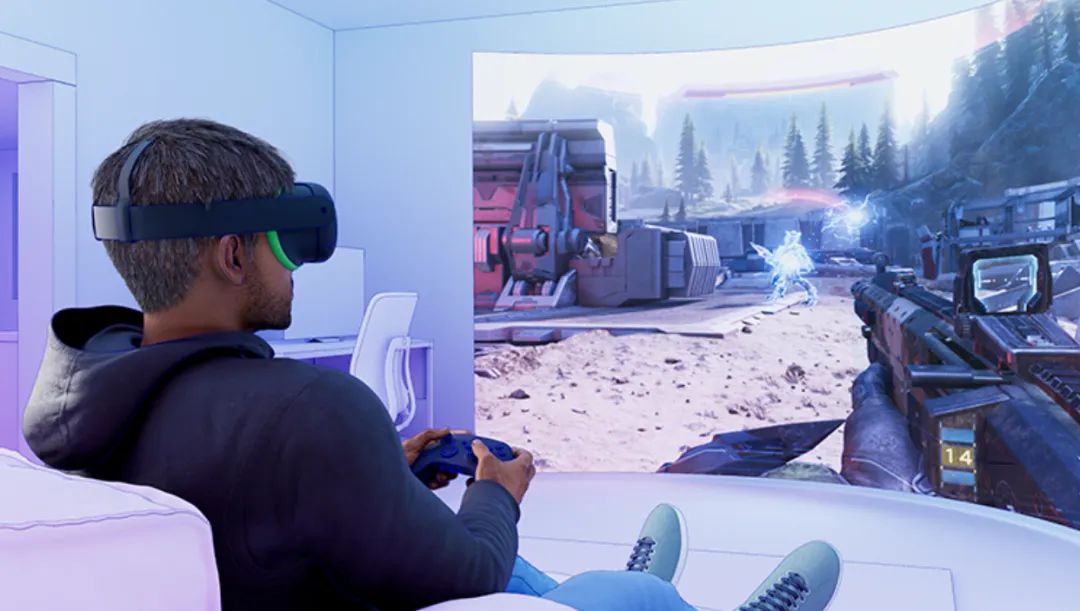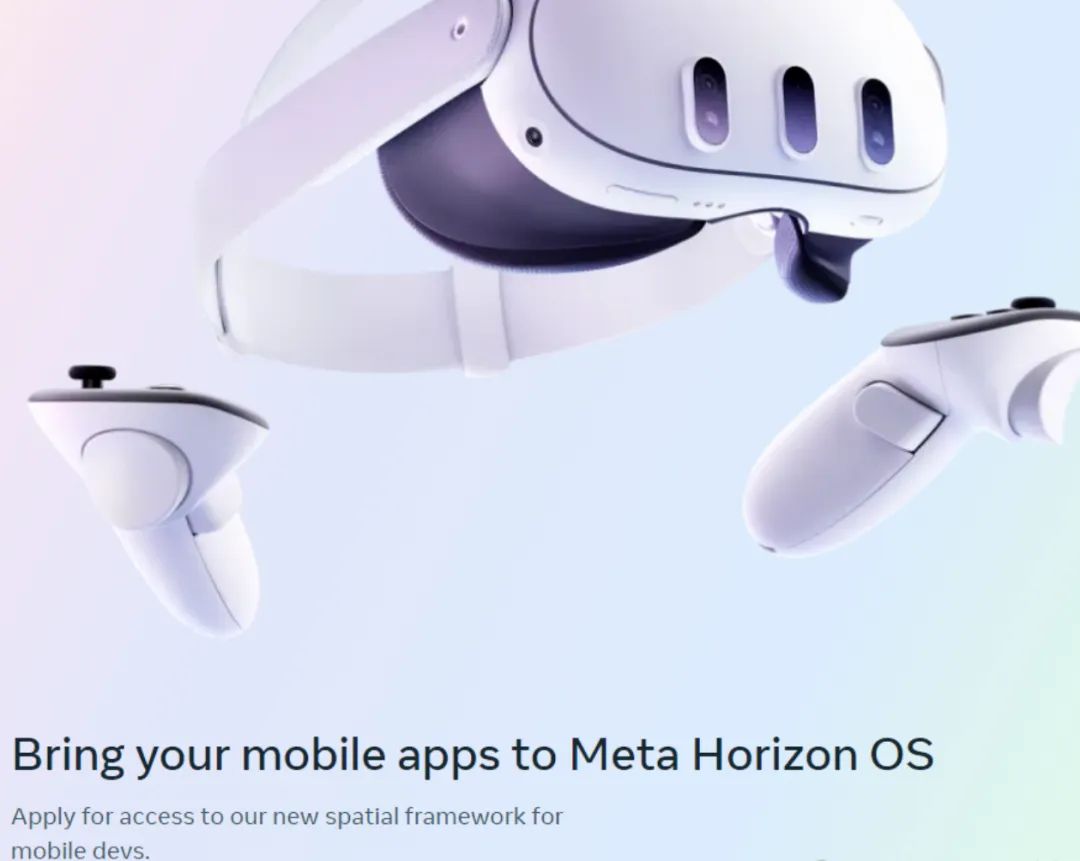META opens up metacosmic spatial computing OS system, industry vendors have mixed feelings
Time: Apr 25, 2024Views:
Recently META head Zuckerberg in open source after Llama 3, and announced that it will open Meta Horizon OS (Quest's operating system) to third-party hardware manufacturers, currently Lenovo, Microsoft and Asus are the first batch of partners. The move means that META will follow Microsoft's example of licensing its Windows operating system to third-party PC makers, providing software support for the entire VR/AR industry.
The Meta Horizon OS is also based on the Android AOSP, a field that Meta has been working on for 10 years. The system is equipped with Inside-Out self-tracking technology, gesture tracking, full-color perspective, scene understanding, spatial anchoring and other leading level, and also covers a complete set of perfect software solutions, including eye/face tracking, Avatar, etc. Meta Horizon OS is also the largest meta-universe spatial computation OS system, and it will become the strongest meta-universe open OS system in the industry after opening. Meta Horizon OS is also the largest metaverse OS system in the industry, and will become the strongest metaverse open OS system platform in the industry.
The Meta Quest family of products has shipped more than 20 million units, and Reality Labs, the division behind its VR/AR, has invested a massive amount of money into it, meaning that every quarter the Reality Labs division invests billions of dollars into virtual reality technology. meta reports that the division's revenue for the fourth quarter of 2023 was $1 billion, with an operating loss of 4.65 billion dollars, and the division's full-year loss for 2023 would already be $16.12 billion, showing how much resources META is betting on it.
The Meta Horizon OS operating system, which is being released, allows more companies to build different products and services on it, with the goal of, once again, allowing open models to define the next generation of computing, i.e., meta-universes, glasses, headsets, etc., according to an introductory video posted by Zuckerberg.

Zuckerberg said that META has been building Meta Horizon OS for nearly a decade, initially starting with Android, and by now for the purpose of has evolved it into a broader, more powerful operating system for mixed reality and spatial computing, and is still compatible with Android, which can provide ample flexibility for the industry.
The core idea of Meta Horizon OS is to be able to make you feel a sense of connection with people wherever you are, to bring digital objects such as huge screens into your physical space, as well as navigating and interacting in virtual spaces, and to support developers and creators to build entirely new apps and experiences, which can be paired with a computer on your desk to provide the best possible work experience.

Zuckerberg said that opening up the operating system is the next step in enabling a variety of different usage scenarios for the meta-universe, and that it could take a few years for new products supporting Meta Horizon OS to start rolling out, and that future vendors who use Meta Horizon OS will be labeled with the phrase "Built with Meta Horizon OS" on the box of vendors using Meta Horizon OS in the future.
META will also be opening up a storefront, renamed the Meta Horizon Store, which will be available on Steam, Xbox, Cloud Gaming, META's own App Lab, and Google Play on Quest or any headset running Meta Horizon OS. At the same time The original Meta Quest companion app, Meta Quest, will also open up and be renamed Meta Horizon. Third-party hardware manufacturers will also need to tie in a Meta account when using the Meta Horizon OS app store, similar to Google's GMS.
Meta also said in the announcement that "we are beginning to remove the barriers between the Meta Horizon Store and App Lab," a beta app distribution platform introduced by Meta that allows software to go live without having to go through Meta's vetting process, which earlier allowed users to Earlier, users could find apps on the App Lab through the Meta Horizon Store's search box. In the future, the App Lab will become a specialized section of the official app store.
According to the developer's information, along with the improvement of Meta Horizon Store, starting from May 22nd, the app stores in Norway, Sweden, Denmark, Switzerland and New Zealand will no longer be billed in US dollars, and will use local currencies instead, which may be Meta's preparation for opening up the ecosystem.
Regarding PC VR content, Meta Horizon OS devices also support original streaming protocols such as Steam Link or Air Link, and Meta has also launched a program called "Bring Your Mobile Apps to Meta Horizon OS" on its developer website, 2D. App developers can quickly port their apps to the headset based on the new spatial framework developed by Meta.

In addition, META has also brought Qualcomm into its fold, with Qualcomm CEO Cristiano Amon stating, "The convergence of physical and digital space is accelerating, and we're seeing VR, MR and AR become the next computing platforms. To realize this future, these high-performance devices need new Snapdragon processors. Our partnership with Meta has delivered exceptional experiences that have become industry benchmarks, and we are excited to see this new ecosystem taking shape."
Meta did not elaborate on business arrangements with hardware partners, or the business model for Meta Horizon OS. If we go by Google's Android operating system for cell phones, for example, Google provides the software for free but monetizes its R&D by directing user searches to Google and selling ads next to the search results. Sometimes Google also pays hardware partners to share the ad revenue.
Microsoft has also previously tried to turn Windows into an operating system for VR headsets through its Windows Mixed Reality program, but it doesn't look like it's been very successful so far, which may have something to do with Microsoft's own AR\VR hardware product sales and iterations.
Google has entered into a partnership with Samsung to provide the operating system "XROS" for the latter's new headset, and not long ago Google's official account @GoogleAR&VR posted that there will be an "AR announcement" at the I/O conference in May. At that time, Google will announce more layouts in the field of VR/AR, and it is worth observing whether "XROS" will be opened to all industry manufacturers during the period.
News from the industry chain shows that, at present, in addition to Apple, META, other manufacturers in the headset, generally in the Android OS system, do their own 3DUI optimization, to become their own quasi-OS system platform, and also customized their own application store, the industry fragmentation is very serious.
The reason for this phenomenon, to a large extent, is that the current industry does not have a similar smartphone AR\VR standard model, industry players are almost all in accordance with their own understanding, in the modified Google OS platform stacked on their own can handle the hardware configuration, as for the composition of the AR\VR what are the necessary functions or configurations, the market has not yet formed a consensus on the application of scenarios, we are all still trying to Do a good job on the display sub-screen of the current intelligent terminal products.
META open, the industry, in addition to Lenovo, Asus, Microsoft to follow up, how many manufacturers will also imitate the future, it is still difficult to say, many manufacturers are worried that if also access to Meta Horizon OS, will not everyone need to refer to the Meta Quest series of products to configure the future of their own products, their own existing advantages will not be able to reflect.
At the same time, other practitioners are also concerned about Qualcomm and META cooperation, the future may hide another necessary condition, third-party hardware manufacturers want to use Meta Horizon OS, it must be built on the Qualcomm Snapdragon platform, which for some of their own customized functionality of the minimalist chip manufacturers, it may not be a good thing, because many of the current market price of AR / VR headset products, are less than Qualcomm's current price of AR/VR-enabled chips.
recommend
Jun 07, 2024
With Ouras shipment surpassing one million units last year, the allure of the smart ring sector is gradually emerging. A...
Hot







